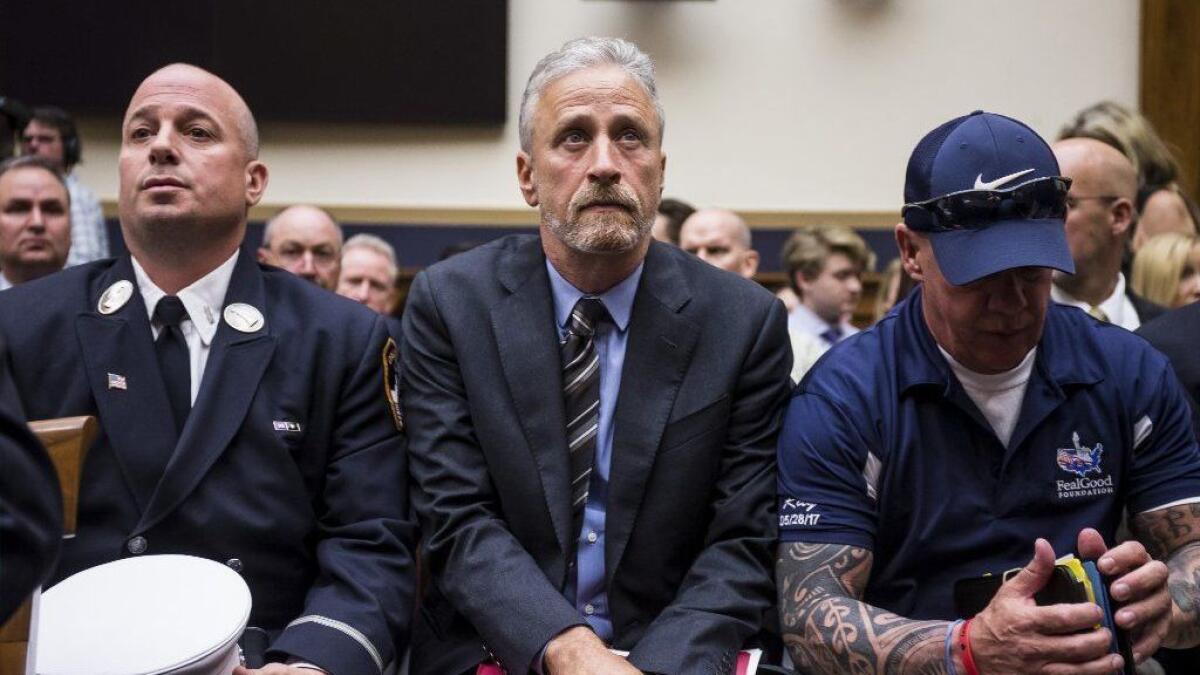Opinion: Jon Stewart just reminded us how outrage is supposed to work

- Share via
Jon Stewart returned to TV today just as we left him: sitting behind a desk, anxiously clicking his pen as he carefully crafted an argument and called for justice. It could’ve been a monologue aired on any episode of “The Daily Show.” Almost. But instead of Comedy Central, Stewart appeared on our screens via C-SPAN. Instead of laughter, he instilled despair; his one-liners now cutting to our hearts rather than our funny bones. He’s still angry as ever, but he’s moved from the peanut gallery into the front row.
We should all take notes: This is what outrage looks like done right. This is how to use shame with purpose and precision, not as a blunt-force tool.
If you’ve been following the political comedian’s post-retirement life, today’s appearance in front of Congress may have been unexpected but not entirely unsurprising. Since leaving television in August 2015, Stewart has pursued a passion project to secure health coverage and benefits for the surviving 9/11 first responders, many of whom have been stricken with cancer and disease in the 18 years after breathing in the toxic fumes of the wreckage. The September 11th Victim Compensation Fund, which supplies first responders with healthcare, is set to expire next year. It should be a stain on all of us that these heroes could die without the help or care that they need.
Stewart knows this. But he knows who shares the burden of the blame, too.
His anger as incisive as it was indiscriminate, he took the entirety of Congress to task. He — like always— spoke truth to power, rather than point fingers at pawns or the powerless. He avoided partisan pot-shots to avoid lowering the argument into partisan terms. He didn’t condescend and he never breathed an air of arrogance. Appealing to equal measures of pathos and logic, Stewart did what he always has done: put a spotlight on feckless cynicism and made sure we all saw.
In many ways, Stewart left TV at the worst possible time. The long, furious burn of the 2016 primaries had just begun. Donald Trump — the frequent butt of many a Stewart joke — began to see a road to the White House. And if any lefty had the cachet to comment on and critique the Clinton-Sanders race, it’d have been Stewart. Surely the man who mastered righteous indignation would have spoken a guiding word or two on the dawning age of internet call-out and cancel culture.
Still, his departure is admirable. This is a man who could have had anything. He could still be on Comedy Central every night. He probably could’ve moved to HBO for a weekly show, or cashed out on Netflix. CNN would surely have hosted his talking head a few times a week. Any publication would welcome regular op-eds under his byline. He could sell out arena after arena on a national stand-up tour. He could command an army of social media followers. But he doesn’t. He graces our lives only in moments of dire need, every 10 months or so, tackling a problem surely all Americans can stand behind yet which still goes unaddressed.
In his wake, Stewart left a respectable family tree of disciples. His “Daily Show” successor, Trevor Noah, and alumni such as John Oliver and Samantha Bee get Emmy acclaim and go viral every other week. Longtime collaborator Stephen Colbert took over the reins from late night godfather David Letterman. NBC’s Seth Meyers’ entire shtick is in debt to Stewart. And yet, that voice of clarity and authority is lacking.
It’s easy to watch Stewart today and think, “Man, we could really use him right now.”
Instead, let’s learn from him. This is how you spark change: not through blind rage or by punching down, but rather unending commitment, arguing with wit, reason and humanity. And valuing, above all else, the truth.
Maybe then he can find his Moment of Zen.
Brian Boyle is The Times’ editorial page intern.
More to Read
A cure for the common opinion
Get thought-provoking perspectives with our weekly newsletter.
You may occasionally receive promotional content from the Los Angeles Times.









